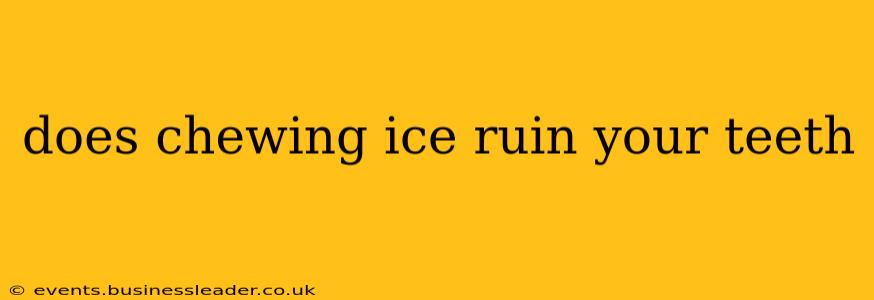Chewing ice seems harmless enough – a refreshing way to cool down a drink. But the seemingly innocent habit can actually lead to significant dental damage. This comprehensive guide will explore the potential dangers of chewing ice, answer frequently asked questions, and offer advice on protecting your pearly whites.
What Happens When You Chew Ice?
The hard, brittle nature of ice makes it a formidable opponent for your teeth. When you crunch down on an ice cube, the force can cause:
-
Cracks and Chips: The enamel, the hard outer layer of your teeth, is the strongest substance in the human body, but it's not invincible. The impact of chewing ice can create tiny cracks or even larger chips in your enamel, making your teeth more vulnerable to cavities and sensitivity.
-
Fractured Teeth: In severe cases, the force can cause a tooth to fracture completely, requiring extensive dental work or even extraction. This is particularly true for teeth already weakened by decay or existing cracks.
-
Broken Fillings or Crowns: If you have existing dental work such as fillings or crowns, the force of chewing ice can cause them to break or become dislodged, requiring further dental intervention.
Can Chewing Ice Cause Tooth Sensitivity?
Yes, chewing ice can absolutely lead to tooth sensitivity. When the enamel is compromised, the dentin (the layer beneath the enamel) becomes exposed. Dentin contains microscopic tubules that lead directly to the nerve of the tooth, making it exquisitely sensitive to temperature changes, sweet foods, and even air.
How Can I Stop Chewing Ice?
Breaking a habit like ice chewing takes conscious effort and often some self-compassion. Here are some tips:
- Identify Triggers: When do you find yourself chewing ice? Is it boredom, stress, or a specific drink? Understanding your triggers is the first step to breaking the habit.
- Find Alternatives: Keep a healthy snack handy, like carrot sticks or sugar-free gum, to satisfy the urge to chew.
- Hydrate: Sometimes ice chewing is a sign of dehydration. Ensure you are drinking enough water throughout the day.
- Mindfulness: Pay attention to when you are chewing ice. Becoming aware of the behavior is crucial in stopping it.
- Seek Professional Help: If you're struggling to break the habit on your own, consider speaking with a therapist or counselor who can help you develop coping mechanisms.
Is it Only Ice That Damages Teeth?
While ice is a particularly hard substance, other hard foods can also damage your teeth. Things like hard candies, nuts, and popcorn kernels should be consumed with caution to avoid chipping or cracking your teeth.
How Can I Protect My Teeth From Ice Damage?
While completely avoiding ice might be difficult, you can minimize the risk of damage by:
- Chewing Smaller Pieces: If you must chew ice, break the cubes into smaller pieces to reduce the force of impact.
- Avoid Using Your Teeth as Tools: Don't use your teeth to open packages or bite hard objects.
- Regular Dental Checkups: Schedule regular visits to your dentist for checkups and cleanings. They can identify and address any potential problems early on.
Does chewing ice cause gum disease?
While chewing ice doesn't directly cause gum disease (gingivitis or periodontitis), it can exacerbate existing gum problems. The forceful chewing can damage the gums, creating small abrasions that are more susceptible to infection. Good oral hygiene practices, including regular brushing and flossing, are crucial in preventing gum disease regardless of ice chewing habits.
What are the long-term effects of chewing ice?
The long-term effects of chewing ice can be significant. Repeated damage to the enamel can lead to increased tooth sensitivity, cavities, and eventually tooth loss. Fractured teeth can require expensive restorative procedures like crowns or root canals. Addressing the habit early is key to preserving long-term oral health.
In conclusion, while chewing ice might seem like a harmless habit, the reality is that it can cause significant damage to your teeth. By understanding the risks and taking preventative measures, you can protect your smile and maintain optimal oral health. Remember, your dentist is your best resource for maintaining a healthy mouth.
